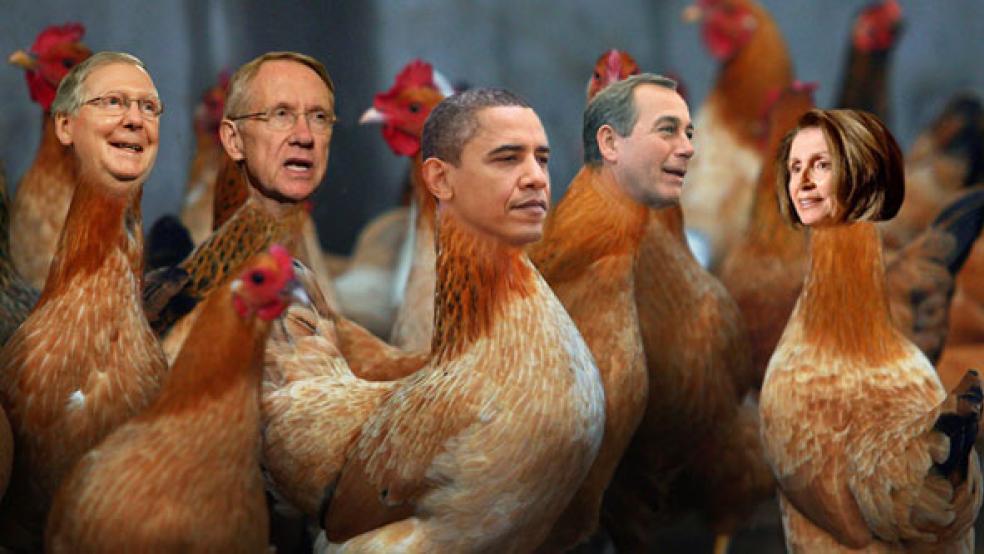As a potential government shutdown looms, where has President Obama been?
With his influence on Capitol Hill severely limited, he journeyed to a Ford auto plant in Missouri on Friday and addressed a Congressional Black Caucus dinner over the weekend to tout his economic record and lash out at Republicans. And as congressional leaders dueled on the Sunday morning talk shows, administration officials were notably absent—choosing to let House and Senate Democrats fight for them.
This particular strategy just might pay off as the president tries to avert the first government shutdown in 17 years. House Republicans last Friday passed a short-term measure to fund the government through Dec. 15, but their bill required that funding for Obamacare be axed.
The president is insulated from this threat, since the bill will never cross his desk.
RELATED: WASHINGTON IN CRISIS AS SHUTDOWN, DEFAULT AWAIT
Senate Majority Leader Harry Reid (D-NV) will strip out the anti-health care language and send the spending bill back to the House with just days to act again before the new fiscal year starts on Oct. 1. Tea Party Republicans, including Sens. Ted Cruz of Texas and Mike Lee of Utah, will be helpless to stop Reid.
Cruz, the freshman Tea Party champion, has enraged many House Republicans by pressing for a showdown with the administration over Obamacare as part of the appropriations process – then signaling last week that he and Lee lacked votes to block Reid's action.
"The House is the only body where Republicans have a majority," Cruz said on Fox News Sunday. "So the House has to lead on this. And I view my job and Mike Lee's job as providing as much support and as much air cover as we can for the House to stand up and lead. And I commend them for having done that last week."
Yet when the Senate version of the continuing resolution returns to the House, some rank and file Republicans are already signaling they will join with Democrats to pass the appropriations stopgap measure to keep the government open.
House Speaker John Boehner (R-OH) will have to make a tough decision on whether to permit that vote or hang tough with the Tea Party crowd and let the clock run out – and the government begin shutting down.
A STRAIGHTFORWARD LINE?
The president and Boehner spoke by phone Friday, during which Obama reiterated the same basic points he made publicly: He won't defund his signature health insurance program; it's the constitutional responsibility of Congress to fund the government; and Congress should automatically increase the government's $16.7 trillion debt ceiling before the middle of next month.
By not wading into the congressional debate, Obama can attack the chamber directly. Unlike his meandering and sometimes contradictory arguments about bombing Syria over chemical weapons, his line against the GOP is straightforward.
At the Ford auto plant on Friday, Obama said House Republicans are trying to "mess with me" and middle class Americans by trying to repeal his health care law. "So that's what they're fighting for," he said. "They want to repeal all that, and they're saying, we're going to hold our breath, and if you don't repeal it – which I've already said I'm not going to do – we're going to send the economy into default. They will send our economy into a tailspin, just like Speaker Boehner said."
In a fiery speech at the Congressional Black Caucus Foundation gala Saturday night, Obama charged that House Republicans' "top agenda" was depriving millions of Americans of health-care coverage. "It is not going to happen. We have come too far. We've overcome far darker threats than those."
WHO WILL BREAK RANK?
Boehner won't speculate on what may happen when the Senate returns the continuing resolution to the House for a final vote.
"The key is that some House Republicans may end up supporting a new measure that does not defund Obamacare because they have already voted" once to do so on the first continuing resolution, said Ron Bonjean, a former House GOP communications adviser. "They've already gone on the record. So some may peel off in order to keep the government running. But this is going to come down to the wire again," he added.
That's true. But it might also be a short-lived victory.
Even if a CR gets passed, the president would be up against a new deadline on the debt ceiling. Unless it gets raised, the government could default on its obligations, an unprecedented catastrophe.
Presidents dating back to Republicans Dwight D. Eisenhower and Ronald Reagan and Democrats LBJ and Jimmy Carter were obliged to cut deals with the out-of-power party to carry out the odious and politically unpalatable task of increasing the Treasury's borrowing authority.
A classic case occurred in 1980, when the House and Senate attached an amendment to a new debt ceiling bill that repealed a central part of Carter's energy policy – an oil import fee that was expected to raise the cost of gas by 10 cents a gallon. Carter vetoed the bill, even though the Treasury was close to default; then the House and Senate overrode the veto, according to The Washington Post.
Boehner will emphasize that, as he tries to pressure Obama into capitulating.
"For decades, Congresses and presidents have used the debt limit for legislation to cut spending, and even President Obama worked with us two years ago in the debt limit negotiations to put controls on spending," Boehner told reporters last week. "This year is not going to be any different."
The Fiscal Times' Josh Boak contributed to this report.





